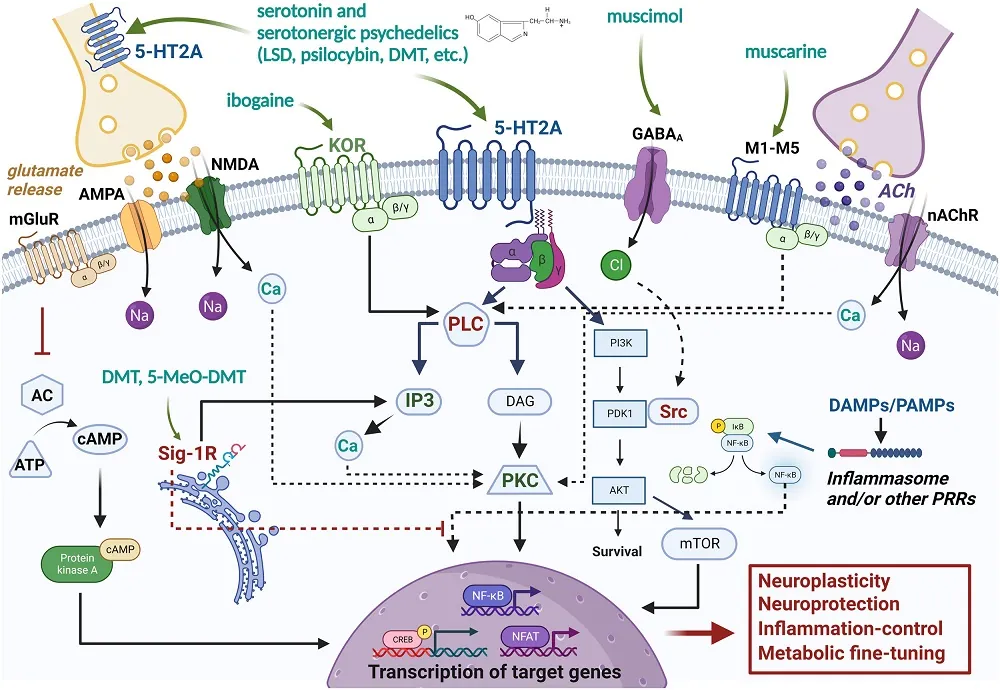A review article published in European Neuropsychopharmacology has described how and why psychedelic compounds may be useful in treating neurodegenerative diseases such as Alzheimer’s.
A question of neuroplasticity
Neuroplasticity refers to the ability of neurons to remodel themselves, forming new connections in response to stimuli. Many psychedelic drugs are psychoplastogens, compounds that encourage neuroplasticity [1].
Alzheimer’s disease harms the brain in many ways, killing neurons and increasing stress on the ones that remain, and so it is no surprise that it impedes neuroplasticity [2]. The downstream effect is that people afflicted with Alzheimer’s not only lose their old memories, they lose their ability to form new ones.
Therefore, many research groups have put these facts together, considering whether or not the plastogenic properties of psychedelic drugs may be enough to impact the trajectory of Alzheimer’s.
A focus on serotonin
Serotonin is well-known as a brain chemical, and it has a wide variety of different modulating effects. Development, regeneration, and plasticity are all affected by serotonin [3]. Serotonin distribution and use are, as expected, impacted by Alzheimer’s disease [4].
Specifically, the serotonin receptor 5-HT2A is crucial to memory retention and cognitive development [5], and psychedelics work in part by directly affecting this receptor [6]. Different drugs also affect different pathways: the well-known lysergic acid diethylamide (LSD) also affect the 5-HT1A and Sig-1R receptors [7], while mescaline affects 5-HT2C more than other compounds [8]. Interestingly, the mTOR pathway is also affected by 5-HT2B activation [9].

The researchers also mention three potentially useful drugs that do not use serotonin. The psychoactive compound in Amanita mushrooms, muscimol, activates the receptor of the neurotransmitter GABA and may potentially reduce the broad overexcitation that comes with Alzheimer’s [10]. Ibogaine, a somewhat toxic compound that broadly affects multiple neurotransmitters, has a synthetic variant (tabernanthalog) that has been tested in rodents to treat addiction [11]. Harmine is promising for neurogenesis and neuroplasticity, but high doses are toxic and impair memory instead [12].
Careful dosing and judgment are required
Unlike with many other compounds, the side effects of psychedelic drugs are very well-known, which has led to their recreational and broadly illegal use. This is, of course the reason why clinical trials are difficult to consider or begin, and tabernanthalog or another synthetic compound may need to be developed before this idea can be clinically tested.
Unfortunately, the mechanisms by which psychedelics cause hallucinations and strange behavior are the exact same mechanisms that make them appealing as potential treatments for Alzheimer’s disease. Therefore, even though many of these drugs are not particularly toxic in the directly destructive sense, any study designers or clinicians who seek to make use of potentially dangerous hallucinogens must carefully determine the extent to which they want to activate serotonin receptors and which compounds they choose to activate them.
Literature
[1] Vargas, M. V., Meyer, R., Avanes, A. A., Rus, M., & Olson, D. E. (2021). Psychedelics and other psychoplastogens for treating mental illness. Frontiers in psychiatry, 1691.
[2] Teter, B., & Ashford, J. W. (2002). Neuroplasticity in Alzheimer’s disease. Journal of neuroscience research, 70(3), 402-437.
[3] Salvan, P., Fonseca, M., Winkler, A. M., Beauchamp, A., Lerch, J. P., & Johansen-Berg, H. (2023). Serotonin regulation of behavior via large-scale neuromodulation of serotonin receptor networks. Nature neuroscience, 26(1), 53-63.
[4] Vann Jones, S. A., & O’Kelly, A. (2020). Psychedelics as a treatment for Alzheimer’s disease dementia. Frontiers in synaptic neuroscience, 12, 34.
[5] Zhang, G., & Stackman Jr, R. W. (2015). The role of serotonin 5-HT2A receptors in memory and cognition. Frontiers in pharmacology, 6, 225.
[6] Vollenweider, F. X., & Smallridge, J. W. (2022). Classic psychedelic drugs: update on biological mechanisms. Pharmacopsychiatry.
[7] Rickli, A., Moning, O. D., Hoener, M. C., & Liechti, M. E. (2016). Receptor interaction profiles of novel psychoactive tryptamines compared with classic hallucinogens. European Neuropsychopharmacology, 26(8), 1327-1337.
[8] Ray, T. S. (2010). Psychedelics and the human receptorome. PloS one, 5(2), e9019.
[9] Ly, C., Greb, A. C., Cameron, L. P., Wong, J. M., Barragan, E. V., Wilson, P. C., … & Olson, D. E. (2018). Psychedelics promote structural and functional neural plasticity. Cell reports, 23(11), 3170-3182.
[10] Xu, Y., Zhao, M., Han, Y., & Zhang, H. (2020). GABAergic inhibitory interneuron deficits in Alzheimer’s disease: implications for treatment. Frontiers in neuroscience, 14, 660.
[11] Cameron, L. P., Tombari, R. J., Lu, J., Pell, A. J., Hurley, Z. Q., Ehinger, Y., … & Olson, D. E. (2021). A non-hallucinogenic psychedelic analogue with therapeutic potential. Nature, 589(7842), 474-479.
[12] Libânio, T. C., Eufrásio, R. A., Niigaki, S. S., Peres, F. F., Silva, R. H., Zuardi, A. W., … & Abílio, V. C. (2022). Harmine impairs memory performance of treated rats and nontreated cagemates. Experimental and Clinical Psychopharmacology, 30(6), 751.





